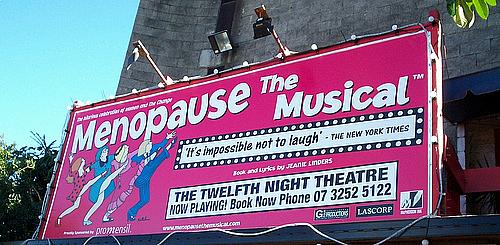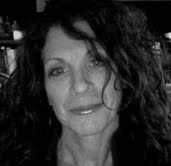Q&A with Liz Scherer: Media should bring women's health in midlife back into focus

 I interviewed health writer and Flashfree blogger Liz Scherer last week about hormone therapy and other women's health issues. The first part of our conversation appeared on Friday. The second part is below. It has been edited for space and clarity.
I interviewed health writer and Flashfree blogger Liz Scherer last week about hormone therapy and other women's health issues. The first part of our conversation appeared on Friday. The second part is below. It has been edited for space and clarity.
Q: In doing writing for pharmaceutical companies and other companies in the medical industry, how has that experience informed what you do on your blog and in your reporting?
A: I believe that my work with pharmaceutical and other companies has taught me more about fair balance than any other training has. This isn't to say, however, that bias never enters into my personal writing because there are those who would argue that I am very much against the use of hormone replacement therapy. However, I try to inform any supposed bias with real evidence and then encourage readers to make their own decision. So in many ways, by working with industry, I've learned to take a more objective approach in all of my work.
Q: Ghostwriting has clearly been a major vehicle for Wyeth and other companies trying to sell their products through the medical literature. Do you think the ghostwriting issue has drawn the attention it deserves or too much attention?
A: I am glad that the breadth of ghostwriting has gained exposure because I believe that it will lead to better rules and regulations. However, again, it's a matter of the pot calling the kettle black. Not every ghostwritten piece is irresponsible and theoretically, these pieces are vetted by peer review. So, do we shoot the messenger or the horse that he or she rode in on? I'm not sure.
Q: You're right. The journals should be able to vet whether the research is rooted in pure science. But the journals themselves are often conflicted. They rely heavily on special sections funded by pharmaceutical companies, for example. Or they are run by editors who derive a good chunk of their income from the same companies whose products are being studied. How can the public know whether a study they are seeing has been shaped at all by the marketing demands of a medical company?
A: I'm not sure that I have the perfect answer for that. Increasingly, researchers are being asked for complete disclosure, just as physicians who sit on pharmaceutical boards are. However, I have long maintained that data analysis is spin, i.e. you can spin the data for personal interests.
In fact, there have been numerous reports over the past several years highlighting dishonesty among researchers themselves, either with the aim of gaining fame or exposure or more selfishly, more dollars. Again, you harken back to industry as the big bad wolf, but I've seen that wolf and I think that it often resides within.
Q: Have you ever been hired as a ghostwriter? If so, what did you learn from that experience?
A: I spent the first decade of my freelance career as a ghostwriter for journals and for continuing medical education programs. I will be the first to argue that not all ghostwriting is created equal and that many of the CME programs I developed were thoroughly vetted by a board of academics residing at accredited institutions. Again, what I've taken away most from my work with industry is the need for fair balance.
Q: Have you been able to get any good stories out of the Drug Industry Document Archive?
A: Admittedly, this is the first I've heard of it. I do most of my research by following up on news media alerts and by searching NCBI for studies and background.
Q: Do you think journalism bears part of the blame for the whipsaw effect readers feel after years of conflicting stories on hormone therapy?
A: No, I believe that all the players bear responsibility. If physicians who treat women don't thoroughly understand the data, and data continue to conflict, how can journalists be expected to impart accurate information? That's why I always encourage my readers to ‘ask the hard questions.'
Q: What aspect of menopause do you think is consistently the most confounding for reporters?
A: I don't believe that most reporters have the time to thoroughly vet and understand their stories because there is a constant race to be the first out of the gate. (Covering) menopause is no different than any other science reporting; if you don't take the time to thoroughly understand the issue, your reporting is always going to be lacking something. When it comes to menopause, the real story is how women's health has been approached and ill-treated for decades, if not centuries.
Q: Might there be a cultural lack of understanding in many newsrooms because so many reporters are quite young and have no connection to menopause personally?
A: I'd love to believe that. But the reality is that reporters don't make decisions about what they are going to report on; their editors do. HRT is sexy; midlife is not. So you will see a lot more stories about hormones and deadly diseases and not a lot of stories that actually inform or empower women.
Q: I think you are letting reporters off the hook. I have never worked in a newsroom where editors made all the decisions. I would say that at least 75% of the stories I have written started with me. So, you're right, midlife is not sexy, but how can reporters do a better job of finding ways to explore midlife and women's health issues that actually get editors' attentions and end up grabbing readers' attentions, too?
A: If I had an answer for that, I'd be a wealthy writer appearing on talk shows. Needless to say, I spend the bulk of my days away from the cameras and the spotlights. As long as aging is swept under the carpet, it's not going to be a sexy story, especially when it comes to women. When women hit middle age, they virtually disappear, which is why cosmetic surgery is such a viable business.
I would like to see more female reporters pushing these pieces, starting at a very young age as opposed to when they actually reach middle age. Women's health is only going to become more important if more women are verbal about it. And if that power rests with reporters, well, then it's time to step up and take the reins.
Q: You frequently talk about alternative therapies on your blog, such as black cohosh. The evidence for many of these therapies is thin. How do you decide when to recommend a therapy and when to stand back and wait for the evidence to come in?
A: One of the primary goals of Flashfree is to provide evidence-based information on alternative therapies. In fact, I can tell you as an ‘n = 1' that an alternative strategy based on a combination of eastern and western herbs has virtually shut down all of my symptoms. I have a lot of anecdotal stories that support my contention that alternative medicine in the right combination and prescribed responsibly by a licensed practitioner can work.
However, from a purely scientific standpoint, I will argue that it's virtually impossible to apply Western methodology to Eastern approaches because the philosophy is very different and distinct. Consequently, something is always going to be lacking in the results. I've written about the distinction on Flashfree and I continue to maintain that if we are truly interested in integrative medicine, we will spend more time retooling methodology to better fit other philosophies so that we can tease out and better define efficacy. I believe that the ACUFLASH trial, which was a RCT that allowed for some individualization by practitioners, is a perfect example of how to achieve this.
Q: Is there an investigative question you would like to see pursued when it comes to women's health issues?
A: If I were allowed to ask one question, it would be this: what do we need to do to change the way that women's health is approached, not only in this country but in others as well? And if I had more than one, I'd like to know why have women consistently gotten the short end of the stick in research and allocation of healthcare resources? Why is pregnancy a pre-existing condition? And why do we continue to treat women as second-class citizens, trivializing health concerns, medicalizing common transitions in life, pushing ‘one size fits all' fixes and generally, disregarding the vital role that women play in maintaining health? Just imagine where the XY chromosomes would be without the X.
Related Post:
Q&A with Liz Scherer: Fighting the medicalization of menopause one post at a time
Photo credit: David Jackmanson via Flickr

